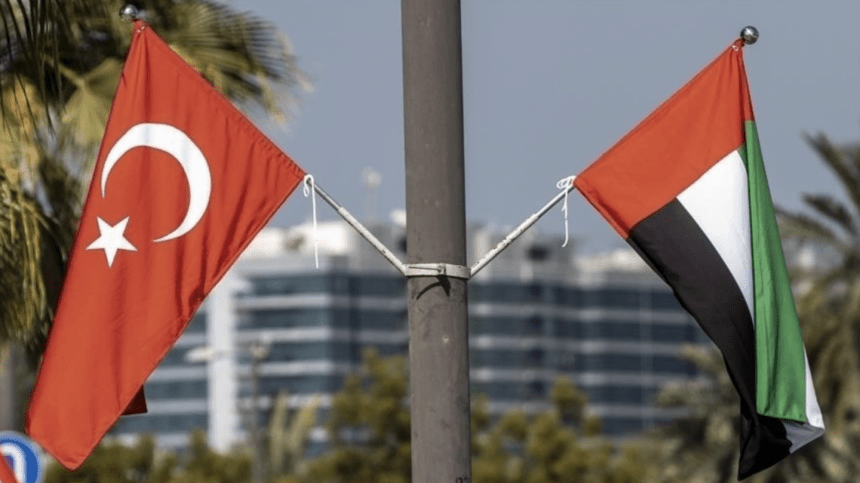One of the cooperation agreements signed during President Recep Tayyip Erdoğan’s visit to the United Arab Emirates (UAE) in July has been sent to the Turkish Grand National Assembly Foreign Affairs Commission. The agreement, which envisages UAE companies to invest 28,500 MW in Turkey in the nuclear, wind and solar fields, requires an investment of nearly 18 billion dollars if all the projects envisaged in the agreement are realized. Describing the agreement as ‘capitulation’, CHP Party Assembly (PM) Member Dr. Baran Bozoglu criticized the commitment to UAE companies to provide land allocation and transmission line capacity in a short time while Turkish companies are looking for locations and capacity for energy investment.
Underlining that although the agreement is called bilateral cooperation, a unilateral concession has been established, Baran Bozoğlu stated that Turkey has nothing to gain from this agreement. Stating that while Turkey aims to be a pioneer in green hydrogen, this strategic area has been left entirely to the UAE capital, Bozoglu claimed that the 5000 MW investment is envisaged to be made in the Taseli plateau between Mersin and Antalya, although it is not officially determined.
“Locals deal with red tape for 3 years, allocation to foreigners in 3 months”
Baran Bozoğlu mentioned that Turkish entrepreneurs who want to invest in the renewable field deal with bureaucracy in more than 30 institutions, and explained that these investment processes take 2-3 years, and that investments are at risk due to insufficient capacity in transmission lines. On the contrary, UAE companies were promised that land allocation and transmission line capacity would be made ready within 3 months, Bozoglu said, “What is wrong with our domestic companies that UAE companies are provided with these opportunities while Turkish investors are not? This mistrust of our industry, our domestic companies, our white-collar and blue-collar human resources is unacceptable.”
Pointing out that this agreement eliminates the ‘fair competition’ environment, which is a sine qua non of a liberal economy, Bozoglu said, “The agreement reminds us of the capitulations that accelerated the collapse of the Ottoman Empire. The agreement in question is a kind of ‘energy capitulations’.”
Baran Bozoğlu said that by creating a capacity war between Turkish companies, the sector is almost pitted against each other and said, “Creating an area without any challenges for the UAE is not a fair and national approach. Our valuable lands, which are national assets covering large areas that are extremely difficult to access for energy investments, will be unconditionally given to UAE energy companies.”
Bozoglu said, “Those who do not provide the connection capacity and land suitable for investment to our local and national companies, which are trying to invest in renewable, clean energy and are kept waiting at the gates of The Energy Market Regulatory Authority EPDK and Turkish Electricity Transmission Corporation TEİAŞ, provide this privilege to the companies of the United Arab Emirates. With this agreement, our country is almost defined as the real estate agent of the United Arab Emirates.”
Which investments will be made under the agreement?
RENEWABLE AND CLEAN ENERGY
* Offshore wind power up to 2500 MW
* Onshore wind power with battery storage up to 3000 MW
* 5000 MW to produce green hydrogen and/or green ammonia
* Pumped storage HEPP up to 2000 MW
NETWORK AND TRANSMISSION
* Battery storage project up to 1000 MW
* Electricity interconnection projects in third countries THERMAL POWER PLANT
* Coal-fired power plant up to 3000 MW, including a 1200-1800 MW cycle power plant in Ambarli, Istanbul
NATURAL RESOURCES AND NEW TECHNOLOGIES
* Rare earth metals
* Other hydrogen
* Carbon capture utilization and storage
ENERGY EFFICIENCY
* Nuclear power plant project up to 6000 MW
* Waste heat and renewable heat utilization
* District heating and cooling
* Energy efficiency investment in end-use sectors
* Cooperation in ESCO projects
* Nuclear fuel manufacturing
* Advanced nuclear reactors
* Developing the nuclear workforce and supply chain
Nuclear financing
Article 3 of the agreement, titled ‘Main Principles’, includes the financial support and allocations to be provided.
According to the agreement, the UAE side will evaluate projects related to nuclear energy and will be able to provide financing if appropriate. The Turkish side will identify and allocate the necessary sites for the projects.
The UAE will be notified within 3 months after the agreement enters into force, and no project negotiations will be held with another investor for a period of 18 months. Turkey will facilitate obtaining permits, licenses and EIA evaluation process. Sufficient capacity will be allocated for energy projects in the national transmission system, except for interconnection projects.
“Dispute will be settled amicably instead of arbitration”
According to the agreement, disputes between the parties will be resolved amicably through consultations or negotiations. The agreement will remain in force for 10 years and will be automatically extended for 3 years each without 3 months’ notice. The agreement can be terminated at any time by mutual consent. This will be notified to the other party at least 6 months in advance.










